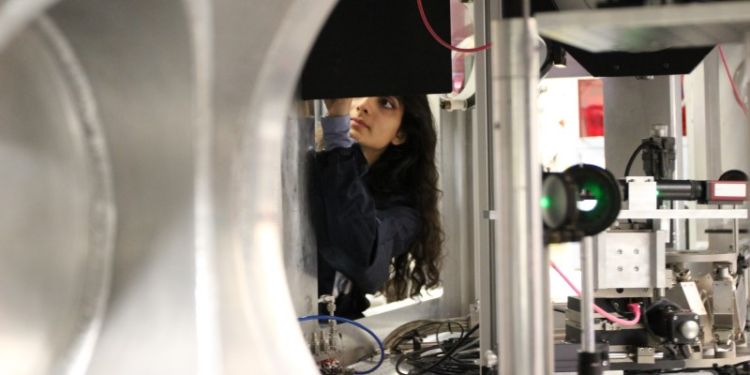
Asha Patel
- Course: Natural Sciences BSc (Industrial)
- Year of graduation: 2020
- Job title: Machine Learning Research Engineer
- Company: Luminance
- LinkedIn: https://www.linkedin.com/in/asha-patel-489615186/
Asha completed her BSc undergraduate degree in Natural Sciences in 2020 before pursuing her Masters degree in Data Science and Analytics at the University of Leeds. She is currently working at Luminance as a Machine Learning Research Engineer.
Undergraduate life at Leeds
When it came to choosing a university course, Asha struggled to pick a favourite subject from Mathematics, Chemistry and Physics. Many of the scientific advancements that she found most interesting were the result of interdisciplinary work, and she saw great value in combining knowledge from different disciplines. Eventually she discovered the Natural Sciences course offered at the University of Leeds, which provided Asha the unique opportunity to study all three of these subjects.
Asha chose Leeds because Leeds provided the perfect combination of a course that suited her interests exactly, while also offering the kind of university experience she wanted. She said, “The campus was self-contained yet close to the city centre, and there seemed to be plenty of exciting things to get involved with, from university societies to nightlife in the city.”

“I really enjoyed my course. The opportunity to study three subjects in Year 1 and specialise later on was ideal for me and allowed me the time to find the areas which interested me most. Now that I am working in the field of AI and Machine Learning, I’m very happy about the path I took throughout my degree; ultimately I think the flexibility and breadth of choice that Natural Sciences offered was invaluable in leading me to opportunities that may have been closed off if I had chosen a single honours course.
The variety of modules I studied and multidisciplinary topics I was exposed to gave me a unique perspective when it comes to problem solving. For example, studying Mathematics enhanced my understanding of Physics, and learning to code provided a new tool that could be applied in both subjects. I began to understand the potential of AI and Machine Learning by seeing it applied in Mathematics and Physics, and even at their intersection with Chemistry and Biology.”
The variety of modules I studied and multidisciplinary topics I was exposed to gave me a unique perspective when it comes to problem solving.
Year in industry
“After my second year I was unsure of what I wanted to specialise in. I was aware that working in industry would be quite a different environment and require different skills to university work. I wanted to experience this before finishing my degree so that I could gain a better idea of the kind of career I wanted and therefore tailor my choice of modules towards this.
I worked at the Central Laser Facility (CLF) in Rutherford Appleton Laboratory. This is located on Harwell campus in Oxfordshire, along with many other world-leading research and technology facilities. The CLF is home to an array of lasers which are used by research groups for a variety of experiments, from plasma physics to spectroscopy and molecular dynamics. I was part of the team who ran the high-power Gemini laser.”

I wanted to work in the industry before finishing my degree so that I could gain a better idea of the kind of career I wanted and therefore tailor my choice of modules towards this.
“My role was fairly varied and I was able to tailor it towards my particular interests. However, on a daily basis I would attend a morning meeting with the research group in which we’d discuss their plan for the day and address any problems with the experimental set-up. For me this often meant liaising with the engineering teams to source equipment and fix diagnostics in the target area (the experimental area into which the laser is fired). I also spent some time working in the laser room itself, i.e where the laser pulses are generated and amplified.
As well as working with external research groups using the facility, a large proportion of my role involved working with scientists who ran the facility to improve the laser system, which involved both theoretical and experimental work. My most notable achievement was proposing and designing a Convolutional Neural Network for detecting laser-induced damage in extremely expensive, important optics!
My placement year was invaluable in helping me to discover what I did and didn’t enjoy. While I had only recently started learning to code, during my placement year I found myself turning to code to solve many problems, from automating data analysis software to developing neural networks for the detection of laser-induced damage. This influenced the path I followed throughout the rest of my degree, as I began specialising in more computational modules and exploring the applications of
Machine Learning.”
While I had only recently started learning to code, during my placement year I found myself turning to code to solve many problems, from automating data analysis software to developing neural networks for the detection of laser-induced damage.
Building a career in AI and Machine Learning
After completing her undergraduate degree in Natural Sciences specialising in Mathematics and Physics, Asha continued her Further Education journey by pursuing a Masters degree in Data Science and Analytics, graduating in 2021. She later joined Luminance as a Machine Learning Research Engineer. Luminance is the world’s most advanced AI technology for the legal processing of contracts and documents, and her team explores and applies the latest research in Machine Learning and AI.
“My role involves researching and experimenting with state-of-the-art Computer Vision techniques that could help us to process and understand documents in new ways. In general, I am interested in the wide-ranging applications of Machine Learning, Data Science & AI and their potential to solve important problems and have a meaningful impact. For example, my MSc project involved using Deep Learning to identify aneurysms and blood vessels in 3D brain scans.”
Advice and tips
“The Natural Sciences course is certainly challenging. Studying three subjects in year 1 - some of which may require spending time in a lab - gives you a lot of contact hours, and although this decreases in later years you are then expected to spend more time studying independently. It’s therefore important that you pick modules which you find truly interesting and which act as prerequisites for modules you may want to study later on. When making these decisions, and for any other support you may need, it’s really helpful to speak to lecturers, tutors and even other students.”
Find out more
Discover more about our Undergraduate degree courses in the School of Chemistry.

